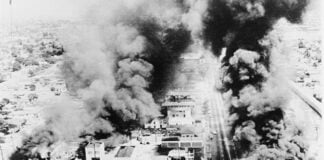Review: In the Loop
Directed by Armando Iannucci, In cinemas now
IN THE loop is a satire about the government machinery of the US and Britain preparing for war against an un-named country in the Middle East. Of course it’s about Iraq.
The US President is unseen, as is the British PM, so the mockumentary focuses on a British junior Minister, his new aide and a section of the US State Department and Pentagon against a war.
In order to carry the junior and wavering middle-ranks of the British government, the PM’s media adviser and enforcer Malcolm Tucker sees to it that he abuses and bullies all who waver.
Simon Foster, Minister for International Aid, can’t quite get the party line right, which is to neither “confirm nor deny” war is on the agenda. When he departs from Tucker’s script, the media latch onto his gaffe and continue to hound him into further gaffes, like “climbing the mountain of conflict”. This becomes a running gag throughout the film.
Foster is then shunted between London and Washington by the pro-war Tucker and US bureaucrats against the war, as each side tries to find allies to bolster their case.
There are plenty of laughs as Tucker spews his venom on his own people and Foster’s cowardice over his career sees him flip-flopping on what he stands for. His aides provide no help, as they too are interested in their own careers.
The scene where Tucker finally delivers British “intelligence” to the US delegation to the United Nations is hilarious, as he never had any.
Limited picture
The film has faults on several levels. Bush and Blair were far more venal, cynical and ruthless than In the Loop shows. Their lies were stupendous compared to Tucker’s.
Its setting, in the middle layers of government, means that once war is declared, almost all its opponents snap back into line. US General Miller’s previous anti-war stance is only pragmatic not principled.
There is not a hint of the anti-war movement in either country, so by the time Australia sees this film in 2010 (It was released in Britain in April 2009) it just fuels cynicism and apathy about government decision-making in the decaying democracy of the neo-liberal era.
At the time of the anti-war protests in February 2003, the New York Times called the movement “the world’s other superpower”.
In order to see this film you have go find some of the smaller “independent” cinemas to see it. In Melbourne, only four out of 456 screens were showing it. This is just one more of the injustices of the Iraq war.
By Tom Orsag





